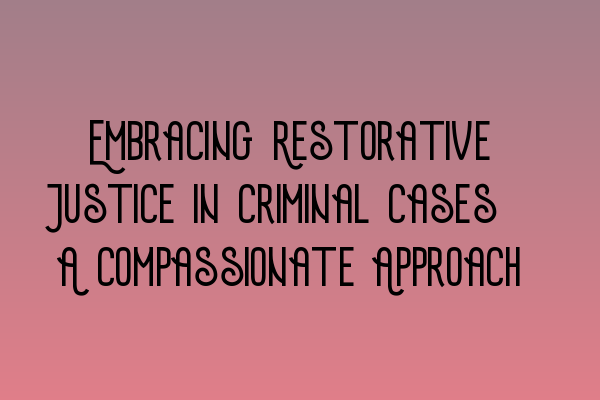Embracing Restorative Justice in Criminal Cases: A Compassionate Approach
Restorative justice is a concept that aims to transform the criminal justice system from a punitive approach to a more compassionate and healing-oriented approach. It focuses on repairing the harm caused by the crime and restoring relationships, rather than solely punishing the offender.
Benefits of Restorative Justice
Restorative justice brings several benefits to both victims and offenders. It allows victims to have a voice in the process and helps them heal by providing a safe space for expression and validation. Offenders also benefit by taking responsibility for their actions, understanding the impact of their behavior, and actively participating in their own rehabilitation.
Furthermore, embracing restorative justice in criminal cases can lead to reduced recidivism rates. Studies have shown that offenders who go through restorative justice programs are less likely to reoffend compared to those who only face traditional punitive measures.
How Restorative Justice Works
Restorative justice involves bringing together the victim, offender, and relevant stakeholders in a mediated dialogue. The process promotes open communication, empathy, and understanding between all parties involved.
During a restorative justice conference, facilitated by trained professionals, the victim has an opportunity to share the impact of the crime on their life and ask questions to the offender. The offender, in turn, takes responsibility for their actions, expresses remorse, and seeks to make amends.
The conference may also involve discussions on reparations, such as financial compensation or community service, aimed at repairing the harm caused by the crime. Other community members or support personnel can participate in the process to provide guidance and support.
Integrating Restorative Justice into the Criminal Justice System
While restorative justice has gained recognition and support globally, its integration into the criminal justice system is still relatively limited. However, there are successful pilot programs and specialized courts that have adopted restorative justice principles with positive outcomes.
To fully embrace restorative justice, policymakers and legal professionals should work together to incorporate restorative practices into sentencing options and diversion programs. This will require training for judges, lawyers, and other stakeholders involved in the criminal justice system.
Additionally, the public needs to be educated about the principles and benefits of restorative justice. By raising awareness and promoting understanding, society can support the implementation of restorative justice in criminal cases.
Conclusion
Embracing restorative justice in criminal cases offers a compassionate and holistic approach to addressing the harm caused by crimes. It allows victims to heal, offenders to take responsibility and rehabilitate, and communities to actively participate in the resolution process. To learn more about legal representation and challenges in the criminal justice system, check out these related articles:
- Legal Representation for Delaware LLCs in the UK: Expert Advice
- Ensuring Ethical Business Practices: Delaware’s Code of Conduct
- Legal Challenges for UK Businesses in the U.S.: Strategies for Overcoming Hurdles
- UK Criminal Law: An In-Depth Analysis of the British Legal System
- Legal Challenges for UK Businesses in the U.S.: Strategies for Overcoming Hurdles
